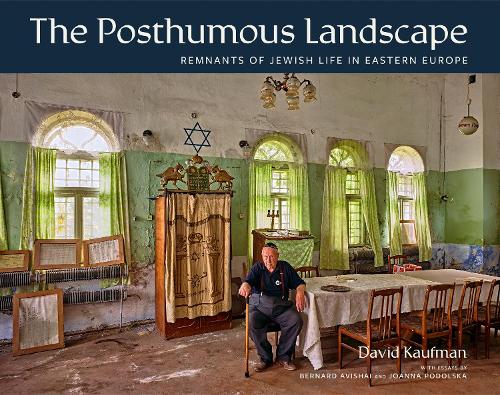
The Posthumous Landscape: Remnants of Jewish Life in Eastern Europe
(Hardback)
Publishing Details
The Posthumous Landscape: Remnants of Jewish Life in Eastern Europe
By (Author) David Kaufman
Commentaries by Bernard Avishai
Commentaries by Joanna Podolska
Figure 1 Publishing
Figure 1 Publishing
28th January 2026
Canada
Classifications
General
Non Fiction
European history
Social and cultural history
Individual photographers
Photojournalism and documentary photography
Physical Properties
Hardback
232
Width 355mm, Height 279mm, Spine 25mm
Description
A photographic tribute that highlights the stories behind remnants of Jewish communal life in post-war Poland, western Ukraine, Lithuania, and Latvia.
In 1992 Canadian documentary filmmaker and photographer David Kaufman travelled to Poland to produce a television program about hidden child survivors of the Holocaust. A decade later, he returned to make films about the Warsaw Ghetto Uprising and the d Ghetto. Kaufman was deeply moved by the quality of Jewish material culture-the physical remnants of Jewish life-that he saw on these early visits. In 2007 he set out on the first of many trips over two decades to record images of tenements, factories, synagogues, and cemeteries that were part of everyday Jewish life in pre-Holocaust eastern Europe. He also made photos of some of the places of despair and death where Jews were killed during the war.
The Posthumous Landscape is more than an act of preserving memory. Kaufman brings his decades of documentary storytelling experience to bear, illuminating these places left behind. His photographs and accompanying texts describe a historic community that played a major role in the development of eastern European society and which left behind grand industrial complexes, urban neighbourhoods, architectural landmarks, beautiful synagogues, as well as vast cemeteries, and haunting memorials. The photographs also tell the stories of the afterlives of those places, many repurposed, some lovingly cared for by non-Jews who remember, and others slowly returning to the earth, but which are preserved in this book's pages.
Some readers will find here names from their own family histories. All will discover a visual landscape that bears witness to the vitality and creativity of Eastern European Jewry before its destruction.
With introductory essays by political commentator Bernard Avishai and Polish journalist and heritage activist Joanna Podolska, The Posthumous Landscape is a tribute to a community that met a tragic end and a testament to how our internal landscapes are inextricably bound to the places of our past.
Author Bio
David Kaufman is a Canadian documentary filmmaker and photographer based in Toronto. His photographic work focuses primarily on the architectural image and the urban landscape. His work in Eastern Europe is represented in a traveling exhibition entitled The Posthumous Landscape: Jewish Historical Sites in Poland and Western Ukraine. His 2013 photo exhibition depicting Toronto heritage streetscapes, Early Sunday Morning, was named a must-see show of the prestigious CONTACT Photo Festival by Toronto Life and NOW Magazine. Other recent exhibitions include Architectural Devolution: Industrial Buildings in a Post-Industrial World, Built to Last: Montreals Enduring Architecture, and Vessels of Song: Faces of New Jewish Music. Kaufmans first film was the widely distributed biography A. M. Klein: The Poet as Landscape. He subsequently spent eighteen years at the Canadian Broadcasting Corporation working as a producer/director on two of its top programs, The Journal and The Fifth Estate, before moving to the independent film sector. Kaufmans documentaries have appeared on CBC, PBS, Bravo!, and the History Channel and include feature programs about the Warsaw Ghetto Uprising and the Klezmer music revival. His most recent film, Song of the Lodz Ghetto, is a feature length work about the d Ghetto and its famous street singer, Yankele Herszkowicz, with music performed by Brave Old World. Bernard Avishai is a well-known writer and commentator about political economy and Israeli affairs. A Guggenheim Fellow, he is the author of The Tragedy of Zionism, A New Israel, The Hebrew Republic, and Promiscuous: Portnoys Complaint and Our Doomed Pursuit of Happiness. He contributes regularly to The New Yorker and has written dozens of articles for Harpers, The New York Review of Books, The Nation, and The New York Times Magazine. He is a former editor of Harvard Business Review, and International Director of Intellectual Capital at KPMG. He is a visiting professor of Government at Dartmouth College, and formerly taught at MIT, Duke, and the Hebrew University. Joanna Podolska served from 2011 to 2024 as the director of the Marek Edelman Dialogue Center in d, Poland, which is dedicated to preserving the multicultural heritage of the city with particular emphasis on its Jewish past. She is currently associated with the Institute of Contemporary Culture at the University of d. Prior to 2011, she worked for eighteen years as a journalist at Gazeta Wyborcza. For three decades she has explored and promoted the rich multiethnic history of d and other parts of Poland through books, articles, and exhibitions, often about significant artistic and political figures such as the writer Chava Rosenfarb, the artist Artur Szyk, the diplomat Jan Karski, and the d Ghetto fighter and medical doctor Marek Edelman. Podolska is the recipient of the Knights Cross of the Order of Polish Rebirth, for outstanding contributions to PolishJewish dialogue, and the POLIN Award, for work to protect the memory of Polish Jews.
